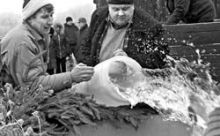According to old Orthodox beliefs, on the day of Epiphany, the feast of the baptism of Jesus, all bodies of water acquire miracle-working qualities; those who have the guts to immerse themselves completely in an ice hole will have all their ills healed. In olden times the vechornytsi gatherings resumed after being suspended by Christmas and New year, with young people playing zabavlianka games, girls singing, doing needlework, and awaiting the svaty matchmakers.
That day a large crowd gathered at the National Academy’s picturesque Museum of Folk Architecture and Daily Life, on a plot of more than 100 hectares in Pyrohovo, a township located not far from Kyiv, to celebrate this great orthodox Christian holiday at the Church of St. Michael surrounded by age-old oaks and richly crowned beautiful pines. The Divine Liturgy began at 10 a.m. People wearing their best clothes and museum staff members clad in folk costumes stood side by side, piously listening to excerpts from the Bible and making the sign of the cross. Ritual bouquets decorated by periwinkle and guelder roses added their fragrance to the festive atmosphere. The museum’s senior research fellow Nina Zozulia told The Day: “Usually, after the Divine Liturgy, the Crucession (procession with the cross) heads for an ice hole where the water is blessed, but this year’s winter is too warm, so we couldn’t perform the ritual according to all rules. If the temperature is at least minus fifteen Centigrade, we cut a cross-shaped hole in the ice and sprinkle it with beetroot kvass to receive the required color. Then the water is blessed. In previous years there were people willing to brave the cold water right after the Epiphany ritual. None ever got sick. On the contrary, they would tell us later that they’d rid themselves of some physical or moral problems. Well, whatever the weather, we adhere to the compulsory elements of the feast, including a gun shot popularly described as ‘driving away the koliada.’”
Incidentally, in heathen times on this day people finished celebrations for their koliadka deity, and a shot was fired to drive away the winter and welcome the spring. When the water was blessed, boys tossed pigeons in the air as symbols of the Holy Spirit that descended from heaven in the form of a dove as Jesus was being baptized in the Jordan...
The church bells started tolling, announcing the Great Blessing of Waters and the Rev. Andrii circled the church, generously sprinkling people with holy water, wishing them the best of health and greeting them with Epiphany.
“Epiphany is a feast of purification and the manifestation of God in the full glory of His divine love,” says the priest.
Interestingly, after Epiphany people celebrate the miasnytsi, the merriest period of the year when you can throw big parties; when the Church allows you to eat all kinds of meat every day, even on Wednesday and Friday that are considered meatless days the rest of the year under church canons. The miasnytsi end on Shrovetide, two weeks before Lent.







